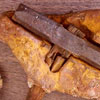Distaff Day
Distaff Day is held on January 7. Medieval Europe. This event in the first decade of the month January is annual.  Help us
Help us

The day after Epiphany (January 6) was traditionally the one on which women went back to work after the 12-day Christmas celebration. A distaff is the wooden rod (staff) that holds the flax or wool on a spinning wheel. The term distaff came to refer to both women’s work and the female branch (distaff side) of the family. As is often the case, it’s hard to go back to work after the holidays and not much got done!
The women’s husbands would mischievously try to set fire to the flax on their wives’ distaffs, while the women, lying in wait, would retaliate with humor by dousing them with buckets of water. The English poet Robert Herrick wrote:If the maids a-spinning goe Burn their flax and fire their tow.Bring the pails of water then Let the maids bewash the men.
Similar holidays and events, festivals and interesting facts
 Old Rock Day on January 7 (This day is completely dedicated to collect different rocks);
Old Rock Day on January 7 (This day is completely dedicated to collect different rocks); Argyle Day on January 8 (The argyle pattern comes from the tartan of Clan Campbell, which originated in Argyll in western Scotland);
Argyle Day on January 8 (The argyle pattern comes from the tartan of Clan Campbell, which originated in Argyll in western Scotland); Bubble Bath Day on January 8 (Bubble Baths have been popular for as long as baths with surfactant-based soap have been a thing);
Bubble Bath Day on January 8 (Bubble Baths have been popular for as long as baths with surfactant-based soap have been a thing); Earth's Rotation Day on January 8 (In 1851, the French physicist Léon Foucault demonstrated how the earth rotates by suspending a lead-filled brass ball from the top of the Panthéon in Paris);
Earth's Rotation Day on January 8 (In 1851, the French physicist Léon Foucault demonstrated how the earth rotates by suspending a lead-filled brass ball from the top of the Panthéon in Paris); Joy Germ Day on January 8 (Back in 1981, Joan White of Syracuse, New York thought of the idea of holding joy germ Day);
Joy Germ Day on January 8 (Back in 1981, Joan White of Syracuse, New York thought of the idea of holding joy germ Day); Apple Tree Day on January 6
Apple Tree Day on January 6 Cuddle Up Day on January 6
Cuddle Up Day on January 6 I'm Not Going To Take It Anymore Day on January 7
I'm Not Going To Take It Anymore Day on January 7 Male Watchers Day on January 8
Male Watchers Day on January 8 Show & Tell Day At Work Day on January 8
Show & Tell Day At Work Day on January 8